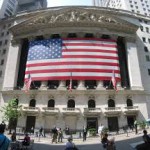
Wendy Long, a lawyer who is trying to oust fellow lawyer Kirsten Gillibrand from the Senate, has a piece in the WSJ today with a compelling headline: “Financial Regulation is Hurting New York.”
True enough. But the 70 percent of the details that Long gets wrong eclipse the 30 percent that she gets right. A more fitting story might be “Pols Who Don’t Understand the Financial Crisis are Hurting New York.”
Long is 100 percent right about the Volcker Rule, named after the tall guy.
Remember that the Dodd-Frank law, which President Obama signed into law 21 months ago tomorrow, contained this provision that forced banks from JPMorgan Chase to Goldman to sell off their “proprietary trading” desks.
The point was that banks with access to FDIC-guaranteed insurance should not be gambling with that money by using it to make “proprietary” bets on whether certain securities will go up or down.
The rule was wrongheaded on two counts. First, as Long notes, proprietary trading didn’t cause the financial crisis. Almost everything but prop trading caused the crisis.
Second, although nobody ever mentions this, the Volcker rule shows a misunderstanding about the purpose of FDIC insurance.
FDIC insurance is not to protect banks; it’s to protect small customers of banks. When the government uses the FDIC right, it’s the opposite of a guarantee for banks. It lets banks fail by protecting only their small depositors, as opposed to big bondholders.
And now, there’s a third reason why Volcker is all wrong: it’s proving impossible to implement. Regulators have spent nearly two years not figuring out not much of anything when it comes to what is proprietary trading and what isn’t.
To understand the stickiness of the question, remember that Wednesday, the New York Fed announced that it may sell off some of the toxic securities it purchased from AIG in 2008 by way of bailing the insurer out.
Who will buy the securities? Probably Goldman Sachs or one of the others. Why? Presumably to untangle them and sell them to clients. Is this proprietary trading? I don’t know, but if it is, the Fed is helping the banks to break the rule’s spirit (the actual rule doesn’t take effect until summer).
So when Long notes that the “uncertainty is pernicious,” she’s right. Good.
On derivatives, though, Long gets it almost completely wrong.
She attacks Dodd-Frank for requiring banks to put more capital (less borrowed money) behind their derivatives and to trade and clear their most derivatives instruments on central clearinghouses.
Long is upset because, she says, “banks have been buying and selling derivatives for years with no impact on soundness.”
Huh? One of the chief reasons behind the bailouts that began in 2008 was unregulated derivatives.
AIG was able to secure its massive bailout because it had guaranteed tens of billions of dollars’ worth of mortgage-related securities without having put money down to back those bets if they went sour.
Moreover, because AIG had not had to execute such derivatives on a central clearinghouse, no one knew who else — meaning banks such as Goldman — might go under if AIG went under. Lehman’s demise caused global panic for much the same reason.
Derivatives regulation was about the only thing that Dodd-Frank — sort of — got right, and former Goldman guy Gary Gensler is doing a bang-up job of trying to put the relevant rules in place.
Where Dodd-Frank and Gensler still err, it’s being too lenient in derivatives markets (for example, allowing for some exemptions of “non-financial” companies) rather than too tough.
Follow @nicolegelinas on Twitter (please).



